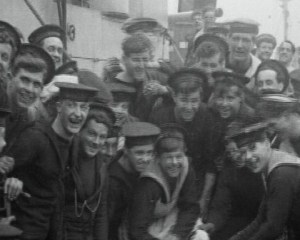GMI Visiting Lecturers Victoria Carolan and James Davey both have articles in the new issue of the Journal for Maritime Research Volume 13, Issue 2, 2011 which are now available online. For a taster here are the abstracts:
Victoria Carolan, ‘The Shipping Forecast and British National Identity’
This article looks at the cultural impact of the shipping forecast issued by the Meteorological Office on behalf of the Maritime and Coastguard Agency. It has a strange status that is unprecedented for a weather bulletin. The forecast has become engrained as a part of British culture and as a signifier of Englishness. This distinction of British and English is deliberate; this article will suggest that while the forecast covers the whole of the United Kingdom, and has an aesthetic resonance that extends nationwide, the characteristics and opinions that it has been used to represent appear to have been made specifically in respect of Englishness.
The article considers reactions to the change of the sea area named Finisterre before looking at the artistic uses of the forecast. It argues that the cultural importance of the forecast has increased at the same time as its functional, informative role has become virtually redundant. Reactions to the forecast from the 1980s onwards have tended to reflect a crisis in English national identity, jostling for position in the ‘new Europe’ and re-evaluating itself at home in light of the establishment of the Scottish parliament and the national assemblies in Wales and Northern Ireland at the end of the 1990s.
James Davey , ‘The advancement of nautical knowledge: the Hydrographical Office, the Royal Navy and the charting of the Baltic Sea, 1795-1815
n 1795, the Hydrographical Office was created to collate nautical charts for the use of the Royal Navy. One of its greatest challenges was to provide reliable charts for fleets sent to the Baltic Sea. The geography of this region was largely unknown to British admirals and policy-makers alike, provoking both operational and strategic issues for the naval administration. Faced with economic threats to its sources of shipbuilding resources during the French Revolutionary and Napoleonic Wars, the Royal Navy was ordered into the Baltic on three occasions. On each occasion its operational viability was determined by the degree to which it could navigate the waters of the Baltic safely. This article traces the success with which Britain was able to come to terms with an environment of which it was ignorant in 1795. In the years immediately after 1795, charts of the Baltic were inaccurate and unreliable. However, repeated incursions into the Baltic during the following 20 years provided an opportunity to gather hydrographical information. British understanding of the Baltic Sea improved dramatically, opening the region to the potency of British naval power. The advancement of maritime knowledge required seamanship and navigational skill in the Baltic, but also an effective administration in London to collect information and retain it for future needs. This article therefore outlines a broad understanding of ‘sea power’ based not just on physical might, leadership and tactics, but on administration and the retention and dissemination of knowledge. This is understood in a context of increasing state engagement with British geography as a strategic tool, as witnessed also by the Ordnance Survey. The development of surveying in this period also tells us much about the ‘quantifying spirit’ of the late eighteenth century, and how such impulses were writ large on the political and strategic world.
